
Aotearoa’s housing system is plagued with problems of unaffordability, of insufficient homes for the population, lack of diversity in housing typology, sprawl, low-quality unhealthy homes, housing insecurity, and more…
A regenerative and collaborative approach is needed.
There are innovative solutions, but they are not well known to the public and even to most housing role players.
This show aims to fill the void in knowledge, highlight what is working well, and empower people with access to information and to a network of change makers.
Episodes
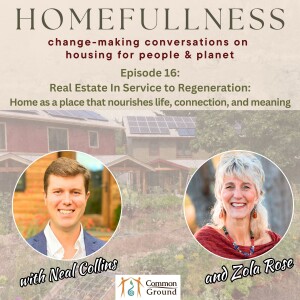
Friday Jun 20, 2025
Friday Jun 20, 2025
Zola explores the concept of regenerative real estate with Neal Collins, founder of the Regenerative Real Estate Podcast and Choose Latitude. The discussion delves into transformative housing models that prioritize sustainability, community engagement, and affordability.
Zola shares her personal journey of finding a suitable site for her tiny home, emphasizing the importance of shifting from an ownership mindset to a stewardship approach and creating a regenerative checklist for assessing potential land for creating a homestead.
Neal discusses the need to reimagine real estate practices, focusing on community-based decision making and ecological design. He describes how the process would look differently if one were doing a regenerative real estate buying or selling versus the conventional approach.
The episode also highlights practical strategies for creating high-performance, cooperative housing that aligns with the principles of regeneration.
02:38 Exploring Regenerative Real Estate
06:04 Personal Journey and Challenges
07:40 Criteria for a Regenerative Home
11:41 Community and Collaboration
13:50 Regenerative Real Estate Concept and Insights
18:45 Challenges and Opportunities in Regenerative Real Estate
27:35 Collaboration potential for professionals working in the regenerative housing sector
39:26 Q&A Session: Steps of buying and selling using a regenerative approach
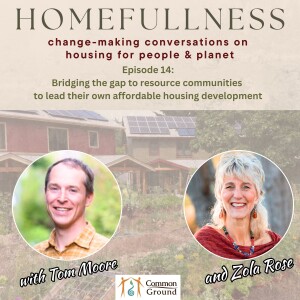
Monday May 26, 2025
Monday May 26, 2025
In this episode, host Zola Rose discusses what creates successful community-led housing (CLH) with guest Thomas Moore, a senior lecturer in Geography and Planning at the University of Liverpool.
They explore the concept of Enabling Hubs, a practical form of advocacy infrastructure, and why these Hubs are so important for overcoming the challenges communities face in achieving affordable and sustainable housing for themselves. Tom explains how these hubs are funded and function and about the training programmes to build capability for community-led housing advocates.
Tom shares his excitement at discovering collective housing models, his insights from his research on Community Land Trusts, the importance of genuine community engagement (not just consultation) and how his planning students are learning from their communities what makes for great homes.
Both highlight the need for robust government support and community participation approaches to planning and development.
Zola makes a case for integrating environmental sustainability into affordable housing projects through frameworks like Permaculture Design.
01:15 Meet Our Guest: Thomas Moore
03:17 Understanding Community-Led Housing
07:26 Thomas Moore's Journey into Housing
14:27 Exploring Housing Models and Innovations
24:49 The Role of Enabling Hubs
35:50 Educational Initiatives and Student Engagement
42:51 Final Thoughts and Recommendations for Further Learning
Books
https://policy.bristoluniversitypress.co.uk/creating-community-led-and-self-build-homes
https://uclpress.co.uk/book/postcapitalist-countrysides/
https://www.liverpooluniversitypress.co.uk/doi/book/10.3828/9781789621082
Podcast
https://middlemarchclh.co.uk/podcasts/
Springhill co housing - https://www.springhillcohousing.com
Enabling hubs report - https://www.shu.ac.uk/centre-regional-economic-social-research/publications/homes-in-community-hands-year-three-evaluation-report
Accreditation training - https://www.cch.coop/clh-training-programme/
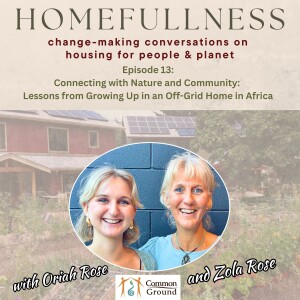
Wednesday May 07, 2025
Wednesday May 07, 2025
In this special episode of the Homefullness Show, host Zola Rose sits down for an engaging interview with her daughter Oriah, a law student at Otago University in New Zealand.
They explore Oriah's unique upbringing in an off-grid homestead in KwaZulu Natal, South Africa.
Topics include their unconventional home setup with indoor and outdoor 'loos,' the transition from a suburban lifestyle to a self-sufficient homestead, their meaningful rituals and traditions, the "free learning" style of education, and living surrounded by wild animals.
The discussion also touches on the broader community involvement through the Woofing program, their intercultural interactions with the local Zulu community, and the various sustainable practices they adopted and shared with schools and visitors.
The episode offers rich insights into intentional off-grid living, the importance of community, and holistic education.
To see a video we made about our homestead where Oriah is narrating, go here:
Link to YouTube video of our homestead: https://youtu.be/dNzA3HPxAB0
00:26 Visiting My Daughter in Dunedin
01:22 Introduction to the Homefullness Show
02:13 Special Guest: My Daughter Oriah
02:24 Our Unique Upbringing in KwaZulu Natal
04:54 Holistic Home Environment
06:41 Family Traditions and Rituals
10:13 Learning and Growing on the Farm
13:25 Eco-Friendly Practices and Innovations
25:35 Coexisting with Snakes
26:26 Wildlife Visitors at the Homestead
29:13 Common Ground Consulting Agency--our services
30:11 Sustainable Living Systems
32:13 Fire Management on the Homestead
36:28 The Woofing Program Experience
40:25 Building and Living in Yurts
42:54 Interacting with the Zulu Community
45:22 Reflections on a Unique Upbringing
48:33 Upcoming Events and Announcements (for those living in Aotearoa NZ)
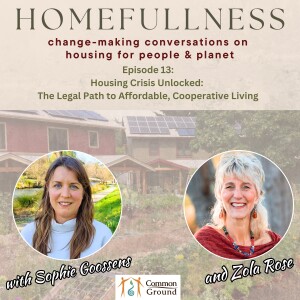
Friday Mar 28, 2025
Friday Mar 28, 2025
Sophie, a public works advisor at Land Information New Zealand, discusses her PhD in law, focusing on achieving housing affordability through collective housing, and cooperative housing in particular.
The conversation covers various aspects, including the lack of research and public awareness on collective housing in New Zealand, her personal experiences with different housing systems in Europe, and the role of local and central governments in addressing the housing crisis.
Sophie emphasizes the need for legal reforms to support cooperative housing structures and discusses her findings on the limitations of the unit title structure for collective housing and how finance and funding is blocked without the legislation for cooperative housing.
The discussion also touches on potential influences from European and Australian models, and the importance of incorporating the “right to housing” into domestic law. The interview ends with Sophie’s aspirations for housing in New Zealand and recommendations for further reading and resources on cooperative housing.
Links
Sophie’s research: https://ir.canterbury.ac.nz/items/e546de2f-eddb-400c-8bc5-5bffb1c04651
Common Ground: https://commonground.net.nz
CoHoHui: https://www.cohohui.com/
The Housing Innovation Society: https://thehousinginnovationsociety.com/
Time stamps
00:00 Introduction: Highlight
00:45 Welcome to the Homefulness Show
01:31 Meet Sophie: A Passionate Advocate for Housing
03:04 Sophie's Early Experiences with Housing
07:22 Housing Challenges in New Zealand
13:58 Sophie's PhD Research and Findings
29:14 Legal and Policy Changes for Cooperative Housing
38:18 Sophie's Current Housing and Future Aspirations
42:12 Fun Facts and Final Thoughts
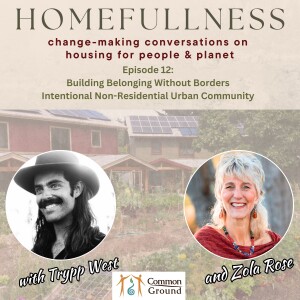
Monday Feb 24, 2025
Monday Feb 24, 2025
In the latest episode of the Homefullness Show, I interview Trypp West, the founder of an urban community called Springfed in Boulder, Colorado (USA). He describes the founding of Springfed, a community that started as his thesis project and has continued for the past three years. The community operates on a non-residential model with the meeting place being his rented farmhouse where they hold fortnightly potlucks and Sunday gardening days to foster social bonds and teach self-sufficiency.
The five take-aways from this interview are:
Community Impact:
The intentional community has profoundly impacted individuals, helping those suffering from depression and disconnection. Members express deeply personal benefits and emotional support from the community, which enhances their sense of belonging and life purpose.
Concept of Homefullness:
"Homefullness" is described as the feeling of being able to rely on and connect with people around you. It emphasizes the importance of interrelatedness and creating a supportive environment that fosters a sense of home.
Development and Leadership:
The community, initiated as a thesis project, has continued to thrive for years. The leadership promotes shared roles and responsibilities, empowering members to take on leadership roles and contributing to the evolution of the community. Leadership includes facilitating conflict resolution and ensuring equitable participation.
Ecological and Social Activities:
Key activities include bi-weekly potlucks that strengthen social bonds, garden days that teach and involve members in sustainable practices, and various thematic events that encourage community engagement and personal growth.
Measuring Success and Future Vision:
Success is measured qualitatively through heartfelt feedback from members rather than formal metrics. The community prioritizes emotional and social well-being through personal testimonies and shared experiences. Future visions include potentially expanding to a more residential model while continuing to foster inclusive and cooperative community practices.
Resources mentioned in episode:
Common Ground: https://commonground.net.nz
CrowsFlyInPairs.com (poetry book)
Upstream, podcast on socialist economics
Iron John, book by Robert Bly on masculinity
Returning to the Teachings by Rupert Ross
Less is More by Jason Hickel
Trypp's email: onatrypp@gmail.com
Zola's: zola@commonground.net.nz
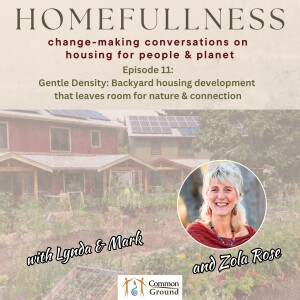
Friday Jan 24, 2025
Friday Jan 24, 2025
Gentle density is a term in Australia for infill housing development in urban areas, to create more housing within existing neighbourhoods, also known as incremental development in the U.S.
In this episode, I interview Mark and Lynda Utting on the Sunshine Coast of Queensland Australia. They share about their way of developing housing in their backyard to give a great place to live to the future residents.
They are able to do this because their area has been rezoned to medium density, meaning they've been given permission to build up to nine units in their backyard.
A lot of people get worried when they hear "density" and infill development because downsides can include shade blocking out nearby houses, it might not match the character of the original neighborhood, too many cars parked on the road, etc.
Yet, Mark and Lynda have come up with a land-use and housing design that I think few would have problems with. They have kept it to four new dwellings because they are prioritising quality of life for their residents and more sustainable and environmental outcomes.
This is a great interview because it showcases how density and infill development can be done better. They speak about the challenges of being lay-developers (not professional) but also the joy and opportunity of learning new skills and knowledge, of creating a sense of belonging to place, and the resources they've found helpful in their endeavour. Visit their instagram page to see what that can look and function like.
We speak to the need for Councils to give incentives for infill development that prioritises better social, environmental, and affordability outcomes rather than the usual profit motive of conventional developers. And that councils can give assistance or support to lay developers to achieve these better outcomes.
So have a listen to this episode about what gentle density and better infill development can look like and how to do it.
Links mentioned in this episode:
Mark & Lynda's Instagram: https://www.instagram.com/gentledensity/
Undercover Architect: https://undercoverarchitect.com/
Renew: https://renew.org.au/
Strong Towns: https://www.strongtowns.org/
Common Ground: https://www.commonground.net.nz/
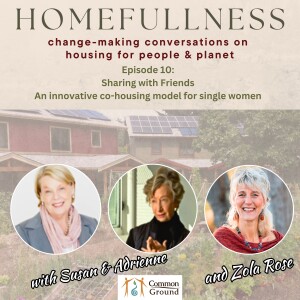
Friday Dec 20, 2024
Friday Dec 20, 2024
The Sharing with Friends housing model was born out of a burning desire for housing justice for single older women who are in the "missing middle"--who do not qualify for social housing but also can't afford market rental or to buy their own home and who are living on the edge of housing insecurity.
The unique co-housing model provides an affordable, secure, and connected way of living where five women, who self-select, share a specifically designed house which offers privacy and automony while also a sense of community, having spaces for shared meals and activities.
I interview Susan Davies and Adrienne Irvine, founders of the Sharing with Friends Foundation about how they formed the foundation and fund the development, how the programme gives women agency by through workshops that empowers them to design how they will live together, and how the model can be replicated throughout Australia and other countries.
https://www.sharingwithfriends.org/
https://www.commonground.net.nz/
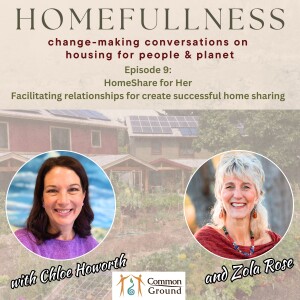
Thursday Dec 05, 2024
Thursday Dec 05, 2024
In our latest Homefullness episode, I interview Chloe Howorth on the HomeShare for Her program located in the Nelson-Tasman region of Aotearoa NZ.
The program addresses the lack of affordable housing and the lack of available housing for single women. Because in our region, according to a Stuff article in April 2023, it says “low wages and expensive housing make the Nelson Tasman area unaffordable” with our housing being the third worst in the country, with some people spending over 50% of their income on housing.
But the other thing that the programme does is it mitigates the problems that can come up when people share a living space together.
You might've seen the program on Netflix called the Worst Roommate Ever. That's enough to make you to never want to have a roommate, pretty gruesome stories.
So, HomeShare for Her hopes to mitigate those kinds of very traumatic experiences, as well as help women have the best possible shared living situation, sharing the home in a way that's equal, where everyone living there feels like the house really is their home.
This a programme that could be replicated in other regions so listen in to learn about how it's done.
That's what we're going to talk about today in our story about HomeShare for Her.
Links mentioned in the show:
https://homeshareforher.nz/
https://www.williamsamuels.co.nz/
https://www.commonground.net.nz/
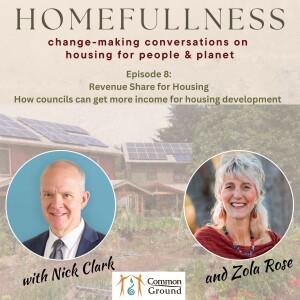
Saturday Nov 23, 2024
Saturday Nov 23, 2024
If you're frustrated by the amount of rates that you pay and the increasing rates that many councils are doing, you are not alone. Many people complain, “councils, all they care about is money.” And yet, they have increasing expenses & responsibilities to pay for with less income--a gap that's been widening over decades. The amount of income that they're able to generate through rates is not covering all the things they're responsible for. So, what is the solution?
Well, we've got Nick Clark, with the NZ Initiative, on to explain to us how the new policy he's proposing called Revenue Share for Housing could work. He says it could clear most council debt and create new income streams for local councils. The benefit is that there'll be more money to be able to support new housing construction and the infrastructure needed for that and rates hopefully won't continue to increase.
So how does this work? Well, we're going to explain about it in this episode, but the basics are that: A portion of the GST that's collected by central government from local councils on new builds would be given back to the councils.
This is really a game changer, so listen in to hear about this policy that could increase the amount of income your counsel is able to generate to create new housing in your area and that might even stabilize the rates.
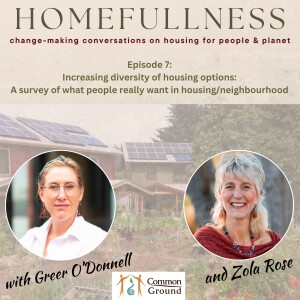
Friday Oct 18, 2024
Friday Oct 18, 2024
In this interview with Greer O'Donnell of The Housing Innovation Society (THIS) and The Urban Advisory (TUA), I speak with her about a growing demographic in housing--the missing middle--as well the increase in people who wish to have more say in the kinds of housing that they want to create and how they want to live in that housing. The New Zealand Housing Survey was created to be able to capture this information.
We speak about the kinds of housing that we could have and how you, the listener, by taking part in the survey, can help define the diversity of the choices in housing and neighbourhoods that we can have and need in Aotearoa NZ.
We also encourage you to join The Housing Innovation Society as a member and come participate in the CoHoHui which will be held 15-17 April 2025 in Ōtautahi (Christchurch).
Links referred to in this episode:
https://www.nzhousingsurvey.co.nz/
https://www.theurbanadvisory.com/
https://thehousinginnovationsociety.com/
https://www.cohohui.com/






